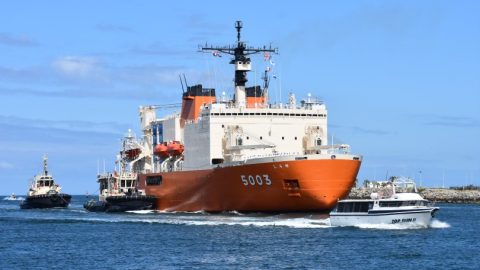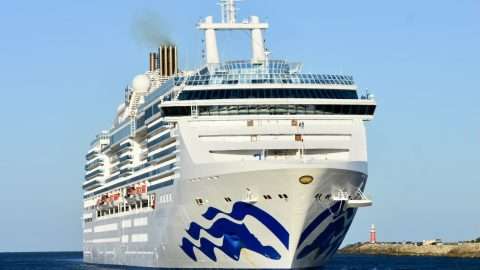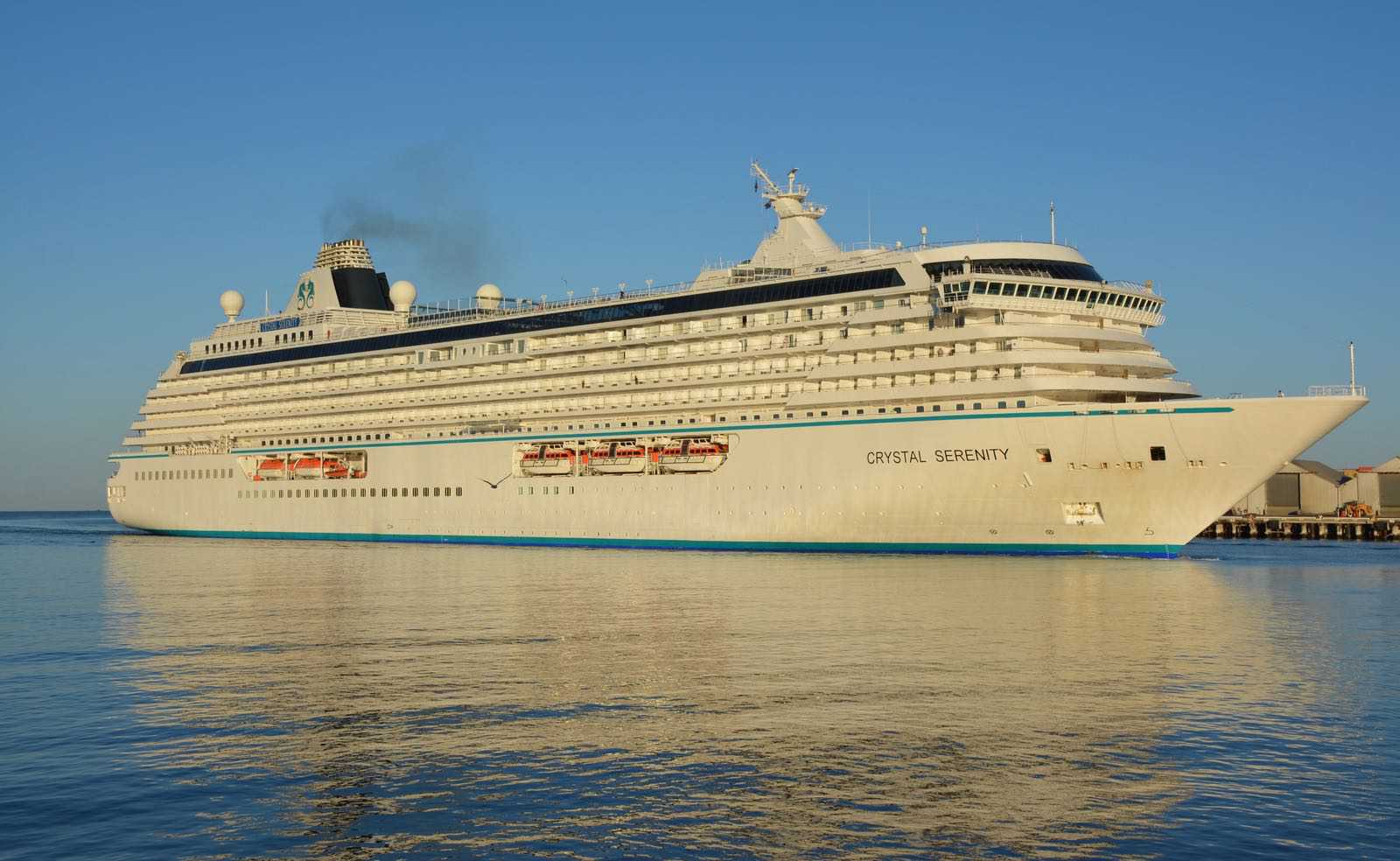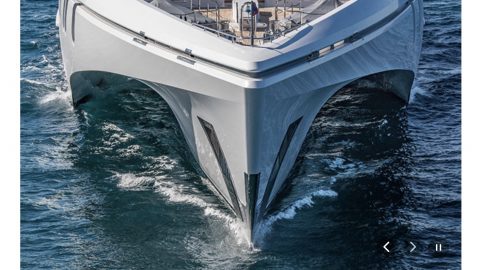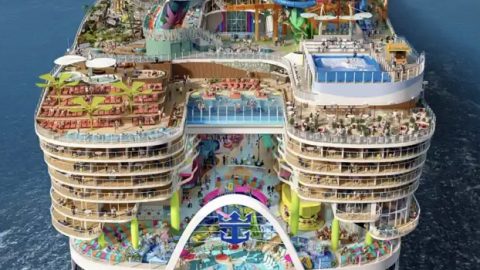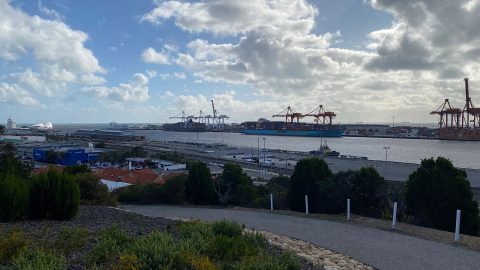Many Fremantle residents will be sentenced to 20 years broken sleep before the Fremantle port is shifted to Kwinana.

Credit Deanna Shanahan
The first container train roars, toots, rattles and shakes its way through Fremantle and the southern suburbs between 4.30 and 5.30 am every morning.

Credit Fremantle Shipping News
The container road trains operate on a 24/7 basis and are both a pollution hazard and congest the roads.
Are these essential services or are they poorly thought-out and socially irresponsible responses to the need to transport shipping containers to and from the port?

20 years is a long time. The current short term strategies around container transport need to be revised in order to develop a long term solution to the rail and road noise and the air pollution. Sections of the Fremantle community suffer because of the highly polluting transport of containers. The short term strategy of using an existing rail line through densely populated Fremantle and other suburbs has to be re-examined. Has the new Stirling Highway container truck bypass route been effective, or hasn’t it?
This article is not about stopping the trains or the trucks, but about the need for container transport to be operated in a socially responsible manner and about placing a limit on noise and air pollution from their operations.
The Fremantle Port Container Rail system was established to divert container transport from trucks to rail, when Western Australia was in pre-election chaos. Decision-making at this part of the political cycle served to create a number of poor decisions which has meant that the port container rail and road transport system has an uneven impact on various parts of the community and in particular the densely populated inner city area of the Fremantle community.
The trains used by the port rail system are old and polluting because they are based out-of-date technology. They pollute by way of noise, vibration and exhaust gases because they use old, large, diesel-fuelled engines.

The noise disturbance is exacerbated by the drivers being required by law to blow their claxons at every crossing.
In addition the trains routinely operate in excess of the 20 kph limit creating unnecessary noise.
It appears that one reason for the port container transport system’s indifference to a socially responsible operation can be found in the Environmental Protection Regulations 1997. It states at reg 3(1)(c) that –
(1)Nothing in these regulations applies to the following noise emissions —
(c)noise emissions from trains or aircraft…
This Regulation gives the train operators permission to do what they like with regards to the way the trains run and when they run, with no requirements to meet contemporary community standards relating to noise and pollution.
The refusal by the train operator WATCO (a US owned subsidiary), the Department of Transport, Fremantle Port Authority, privately owned stevedore companies and the Public Transport Authority to meaningfully communicate with local residents about this suggests a level of arrogance that comes from a reliance on the ‘permission to pollute’ granted by the EPA Regulations.
Freo community members who live along the railway line have been trying for years to get the rail transport system operators to consult with them. The operators of the container rail system are not required to operate in a socially irresponsible manner. However, they appear to do so to maximise profit and their access to the Government subsidy of $50 per container.
Complying with community noise and pollution standards has to be recognised as a cost of doing business in the modern city of Fremantle. The Fremantle Port no longer holds the community of Fremantle to ransom as they did in the past. Most other industries based in Fremantle, such as building, retail, and education routinely comply with community standards. These community standards are not new. There are long standing community standards with regard to managing industry and transport noise and pollution. There are noise abatement arrangements for those living near Perth’s airports, the Fremantle bypass road for container trucks, and the City of Fremantle requirements for the building industry that mean building work has to start after 7.00 am. These standards reflect current community standards and up-to-date research on the negative health impact of noise and air pollution.
There seem to be many options open to the port sea container transport system to reduce noise and air pollution –
• Let’s start with port operators talking with the Fremantle community in a meaningful way. Are the port’s decision makers reluctant to establish an open and accountable system of communication with the Fremantle community?
• They could consider replicating measures taken by the airports sector such as a curfew on container trucks and trains between midnight and 6.00 am. That is, get rid of the 5.00 am train!
• And what about a code of conduct for train and truck operators that establishes a socially responsible way of operating?
In the longer term, the port’s bosses and the State Government could consider –
• creating a subsidy similar to the rail one, to encourage truck owners and operators to operate modern, quieter and less polluting trucks;
• building sound barriers around the inner city parts of the port railway such as exist on the bypass road; and
• subsidising train operators to use more modern, quieter, less polluting diesel electric trains or even better electric locomotives.
The technical know-how exists to do these things and the expertise of key decision makers should mean that there are many more creative solutions to noise and pollution caused by the transport of shipping containers than are currently on show.
It is highly likely that the Fremantle port container transport system will again be an issue for the State election.
Remember, years of disrupted sleep into the future will make residents very grumpy!
* By ‘Dueller’ (name and address supplied)
~~~~~~~~~~~~~~~~~~~~~~~~~~~~~~~~~~~~~~~~
* If you’d like to COMMENT on this or any of our stories, don’t hesitate to email our Editor.
** WHILE YOU’RE HERE –
PLEASE HELP US TO GROW FREMANTLE SHIPPING NEWS
FSN is a reader-supported, volunteer-assisted online magazine all about Fremantle. Thanks for helping to keep FSN keeping on!
*** Don’t forget to SUBSCRIBE to receive your free copy of The Weekly Edition of the Shipping News each Friday!
